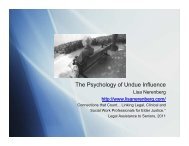Undue Influence: Definitions and Applications - California Courts ...
Undue Influence: Definitions and Applications - California Courts ...
Undue Influence: Definitions and Applications - California Courts ...
You also want an ePaper? Increase the reach of your titles
YUMPU automatically turns print PDFs into web optimized ePapers that Google loves.
4. The testator actually did change his or her post-death distribution plan as a result of the<br />
influencer’s actions; <strong>and</strong><br />
5. The change was unconscionable.<br />
Proponents of wills can defend them by presenting rebuttal evidence, which disproves any of the<br />
five elements.<br />
Blinder (2003) identified the following elements that have proven to be the most<br />
persuasive to the judiciary in demonstrating undue influence in cases involving wills:<br />
• The provisions of the will are “unnatural” (different from what might be expected);<br />
• The dispositions in the will appear to be at war with the wishes of the decedent, expressed<br />
both before <strong>and</strong> after the execution of the will;<br />
• The physical <strong>and</strong> mental condition of the decedent was such to permit a subversion of the<br />
decedent's free will; <strong>and</strong><br />
• The primary beneficiaries under the will were active in procuring the execution of the will.<br />
Ross & Reed (1999) identified five types of relationships that courts consider subject to<br />
undue influence when someone executes a change of a post-death plan by the victim in favor of<br />
the influencer:<br />
1. A “David <strong>and</strong> Bathsheba” relationship, in which a second spouse obtains the<br />
disinheritance of children of an earlier marriage;<br />
2. An “Esau <strong>and</strong> Jacob” relationship, in which a child attempts to obtain the disinheritance<br />
of one or more children.<br />
3. A “Judge Jeffrey Pycheon” relationship, which resembles # 2, but a brother, sister, niece,<br />
nephew, or cousin obtains the lion’s share of the estate at the expense of other kin;<br />
4. A “Uriah Heep” relationship, in which a helping professional obtains all or part of the<br />
victim’s estate instead of the victim’s heirs; <strong>and</strong><br />
5. A “Mary Worth” relationship, in which a neighbor or acquaintance obtains the victim’s<br />
estate at the expense of the victim’s heirs.<br />
103




